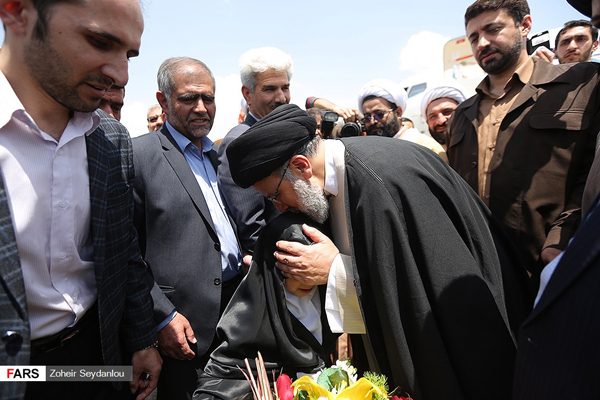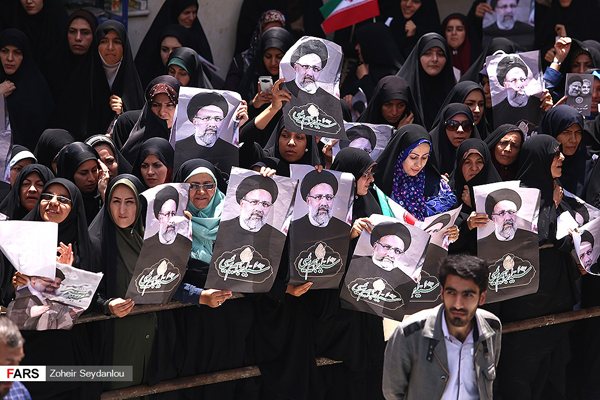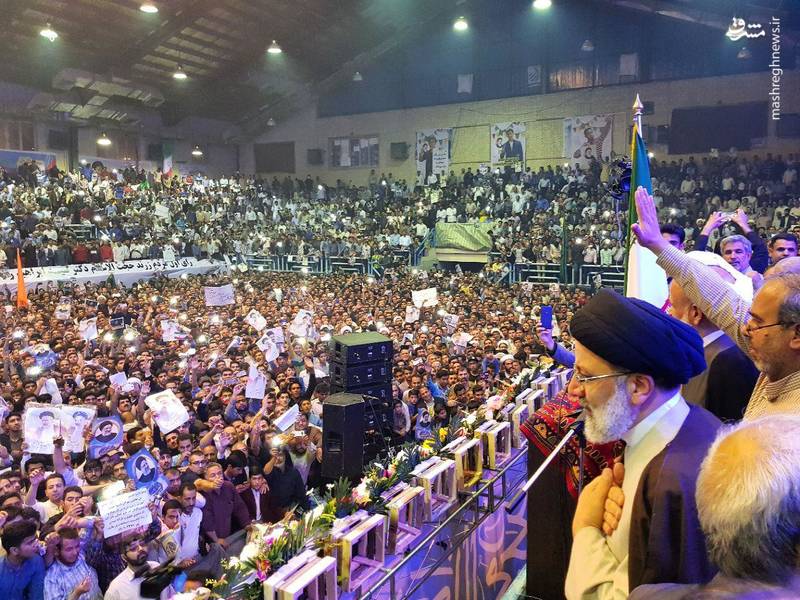Navigation
Install the app
How to install the app on iOS
Follow along with the video below to see how to install our site as a web app on your home screen.
Note: This feature may not be available in some browsers.
More options
You are using an out of date browser. It may not display this or other websites correctly.
You should upgrade or use an alternative browser.
You should upgrade or use an alternative browser.
iran election/ rouhani campaign tehran/+pic
- Thread starter dani67
- Start date
waltky
Wise ol' monkey
Rouhani avoids a run-off with a 57% outright victory over his main rival...

Iran election: Hassan Rouhani says voters rejected extremism
Sat, 20 May 2017 - The president says his re-election shows that Iranians want more interaction with the world.
See also:
Iran's Rouhani wins big but will he deliver?
Sat, 20 May 2017 - The Iranian president has been given a mandate to push through reforms, but how will hardliners react?
Iran election: Hassan Rouhani says voters rejected extremism
Sat, 20 May 2017 - The president says his re-election shows that Iranians want more interaction with the world.
After avoiding a run-off with a 57% outright victory over his main rival, Mr Rouhani said he respected his opponents' right to criticise him. Mr Rouhani, 68, supports the landmark deal to curb Iran's nuclear programme. The decisive victory gives him a strong mandate to seek reforms and revive the country's ailing economy, analysts say. "The Iranian nation has chosen the path of interaction with the world, a path which is distant from extremism and violence," Mr Rouhani said in his first speech after the victory, broadcast on state television. "The election is now over. I am the president of the nation and need assistance from every single Iranian, even those who oppose me and my policies." Mr Rouhani also thanked former reformist President Mohammad Khatami, apparently defying a media ban on citing the ex-leader's name.
What were the results?
Turnout in the election was unexpectedly high, at about 70%. And this is thought to have helped Mr Rouhani, who received close to 23 million votes out of the 40 million that were cast. His main challenger, former prosecutor Ebrahim Raisi received 38.5%, or 15.7 million votes, which was not enough to take the election to a second round. On Twitter, Iran's Supreme Leader, Ayatollah Ali Khamenei, said the election had showed the "increasing progress" of the "Iranian nation". Mr Khamenei said Iran would demonstrate "national dignity" and "wisdom" in relations with other countries. But he did not congratulate Mr Rouhani for his victory. There were celebrations in the capital, Tehran, with young people singing and dancing in the central Vali Asr Square, despite efforts by police to move them, the AFP news agency reported.
What are the challenges?
The economy seems to be the number one issue. Average Iranians say they do not feel the economic benefits after international sanctions were lifted as a result of a nuclear deal signed between Iran, the US and other countries in 2015. While oil exports have rebounded and inflation is back at single-digits, unemployment remains high, especially among young people. Mr Rouhani also promised a moderate vision and an outward-looking Iran and, at rallies, openly attacked the conservative-dominated judiciary and security services. But Mr Rouhani's own powers are limited by those of Ayatollah Khamenei, who has the last say on many crucial and strategic issues.
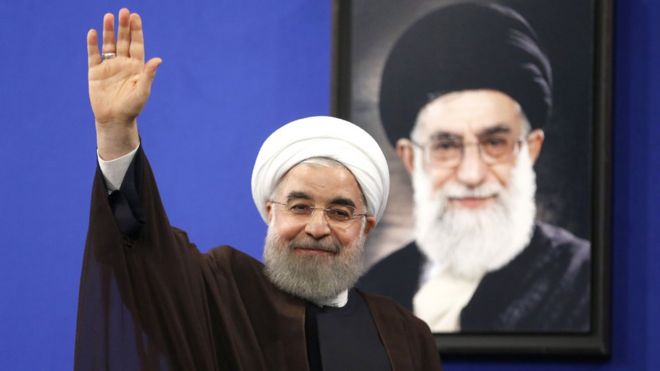
Mr Rouhani was re-elected with 57% of the vote
Another challenge, experts say, comes from abroad, and relations with the new US government under President Donald Trump. Mr Trump opposes the nuclear deal which eased sanctions on the Middle Eastern country, describing it as the "worst deal ever". But, despite the objections, the White House renewed the agreement earlier this week.
'Revenge against hardliners': By Kasra Naji, BBC Persian
See also:
Iran's Rouhani wins big but will he deliver?
Sat, 20 May 2017 - The Iranian president has been given a mandate to push through reforms, but how will hardliners react?
From the outset when the counting of the votes started after midnight in Iran, the early results indicated that President Hassan Rouhani was heading for a landslide. Even in small rural towns many people preferred the vision that he had put forward, a vision in sharp contrast to the inward looking, traditional and hardline Islamic government promised by his main challenger, Ebrahim Raissi.
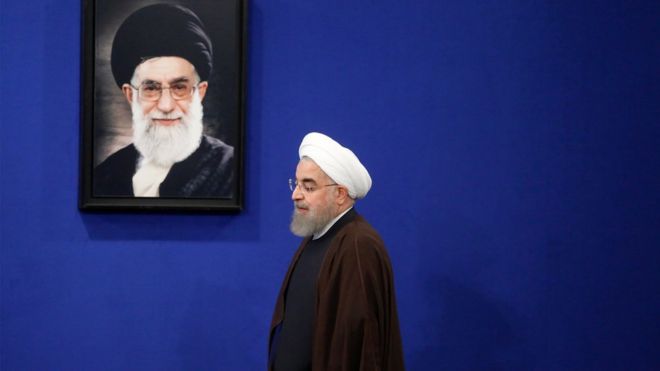
Mr Rouhani has promised to push through reforms but hardliners may obstruct his plans
President Rouhani won 23.5 million votes, or 57%. Turnout was unprecedented - nearly 41 million people voted, or 73.5% of the eligible voters. In Tehran, more than five million people came out to vote, twice the number of 2013. One reason for this high turnout was the reports that the hardliners had pulled out all the stops and mobilised their resources to bring out as many of their supporters as possible to vote, a major push to oust President Rouhani. These reports spurred his supporters and all those who favoured moderation or opposed the hardliners to come out in big numbers.
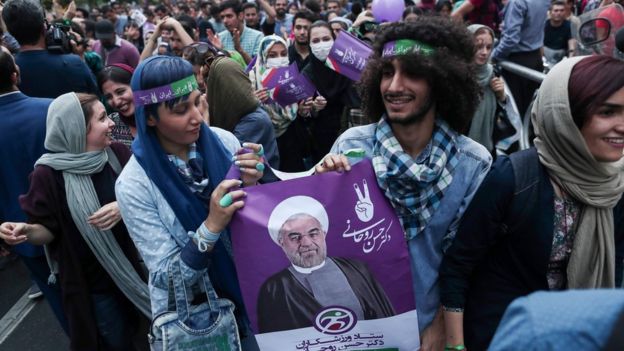
Supporters of newly re-elected Iranian President Hassan Rouhani hold a placard bearing a portrait of him as they take to the streets to celebrate his victory in downtown Tehran
President Rouhani's victory means a major defeat for the hardliners. The vote may indicate that they will never be able to take control of the executive branch through the ballot box, as a big majority of Iranians do not favour them or their vision. In his first televised message after the victory, President Rouhani praised Iranians who, in his words, had said No to returning to the past. He was echoing his election campaign motto "We will not go back," a reference to his hard-line opponents and their "backward" policies. Friday's vote in Iran was the revenge of the moderates. A rejection of those who had intimidated them, jailed them, executed them, drove them to exile, pushed them out of their jobs.
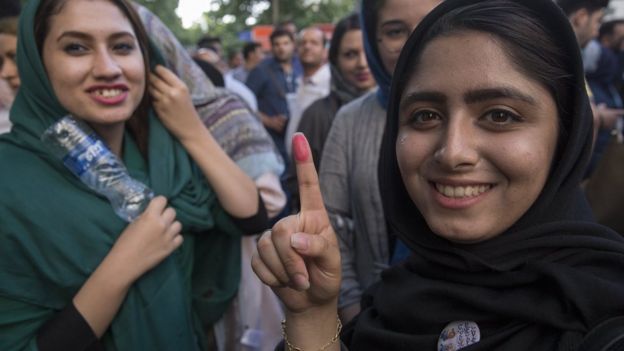
Voters show their ink-stained fingers outside a polling station for the presidential election
In his campaign, President Rouhani promised to put an end to extremism, to open up the political atmosphere, to extend individual and political rights, to free political prisoners, to remove decimations against women and bring under control all those state institutions that are not accountable. To keep and act on these promises, he told his supporters he needed a big mandate, bigger than before. He firmly placed himself in the camp of the reformists. Now, with his re-election, Iran is on the path towards change, with a renewed confidence drawn from the emphatic result.
Building bridges abroad
Similar threads
- Replies
- 57
- Views
- 537
- Replies
- 6
- Views
- 105
- Replies
- 17
- Views
- 369
- Replies
- 5
- Views
- 74
Latest Discussions
- Replies
- 221
- Views
- 1K
- Replies
- 101
- Views
- 445
Forum List
-
-
-
-
-
Political Satire 8872
-
-
-
-
-
-
-
-
-
-
-
-
-
-
-
-
-
-
-
ObamaCare 781
-
-
-
-
-
-
-
-
-
-
-
Member Usernotes 492
-
-
-
-
-
-
-
-
-
-












